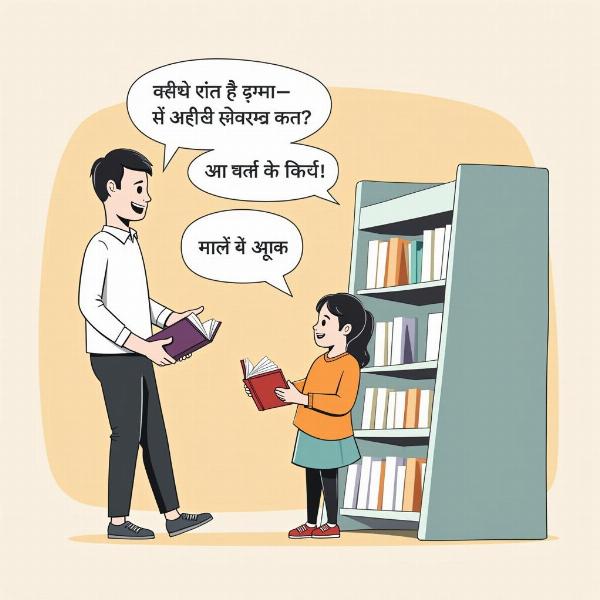Understanding the meaning and usage of “returned back” in Hindi can be tricky, especially for non-native speakers. While the phrase might seem redundant in English, its Hindi equivalent carries nuances that are important to grasp for accurate communication. This article explores the various ways to express “returned back” in Hindi, delving into the subtle differences between them and providing practical examples to ensure you use the correct term in every context.
Different Ways to Say “Returned Back” in Hindi
Several Hindi words and phrases convey the meaning of “returned back,” each with its own specific connotations:
-
वापस आना (Vapas Aana): This is the most common and versatile translation. It simply means “to come back” or “to return.” It’s suitable for most situations and doesn’t imply any specific reason for the return. For example, “He returned back from the market” would be “वह बाजार से वापस आया (Vah bazaar se vapas aaya).”
-
लौट आना (Laut Aana): This term emphasizes a return to one’s original place or state. It carries a sense of completion or returning to a familiar environment. “She returned back to her hometown” could be translated as “वह अपने गृहनगर लौट आई (Vah apne grihanagar laut aayi).”
-
पलट आना (Palat Aana): This phrase indicates a sudden or unexpected return, often implying a change of mind or a reaction to something. “He returned back after hearing the news” could be “वह खबर सुनकर पलट आया (Vah khabar sunkar palat aaya).” This relates to the word palti meaning in hindi
-
वापस लौटना (Vapas Lautna): This combines the general “vapas” with the more specific “lautna,” emphasizing a return to a familiar place or state. It’s more formal than “laut aana” and often used in literature or formal settings.
-
वापस देना (Vapas Dena): This phrase specifically means “to give back” or “to return something.” It’s used when referring to the return of an object, not a person. For instance, “I returned back the book” translates to “मैंने किताब वापस दे दी (Maine kitab vapas de di).”
Choosing the Right Word
The best way to choose the right word depends on the specific context. Consider the reason for the return, the type of return (person or object), and the level of formality required.
- For general returns: “Vapas aana” is usually sufficient.
- For returns to a familiar place: “Laut aana” or “vapas lautna” are more appropriate.
- For sudden or unexpected returns: “Palat aana” is the best choice.
- For returning objects: “Vapas dena” is the correct term.
Common Mistakes to Avoid
One common mistake is using ” वापस पीछे (vapas pichhe),” which literally translates to “back back.” While understandable, it’s considered redundant and unnatural in Hindi. Stick to the simpler and more accurate options mentioned above. Another error is using “returned back” with inanimate objects. In Hindi, we use different verbs for returning objects and people.
 Returning Objects in Hindi
Returning Objects in Hindi
Returned Back in Different Scenarios
Let’s explore how “returned back” translates in various scenarios:
- He returned back from his trip: वह अपनी यात्रा से वापस आया (Vah apni yatra se vapas aaya).
- She returned back the borrowed money: उसने उधार लिया हुआ पैसा वापस दे दिया (Usne udhar liya hua paisa vapas de diya). This relates to nither meaning in hindi.
- The bird returned back to its nest: चिड़िया अपने घोंसले में लौट आई (Chidiya apne ghonsle mein laut aayi).
Expert Insights
According to Dr. Anjali Sharma, a renowned Hindi linguist, “The beauty of Hindi lies in its nuanced vocabulary. Choosing the right word for ‘returned back’ can significantly enhance the clarity and precision of your communication.”
Another expert, Mr. Rajesh Kumar, a Hindi literature professor, adds, “Understanding the subtle differences between ‘vapas aana,’ ‘laut aana,’ and ‘palat aana’ is crucial for appreciating the richness of Hindi literature.”
Conclusion
Mastering the various ways to say “returned back” in Hindi will elevate your language skills and allow you to express yourself with greater accuracy. By understanding the nuances of each term, you can avoid common mistakes and communicate effectively in diverse situations. Remember to consider the context and choose the word that best reflects the specific meaning you intend to convey.
FAQ
-
What is the most common way to say “returned back” in Hindi? Vapas aana (वापस आना) is the most common and versatile translation.
-
How do you say “returned back an item” in Hindi? Use Vapas dena (वापस देना) for returning objects.
-
What is the difference between “laut aana” and “palat aana”? “Laut aana” implies returning to a familiar place, while “palat aana” suggests a sudden or unexpected return.
-
Is “vapas pichhe” correct Hindi? While understandable, it’s considered redundant. It’s better to use simpler options like “vapas aana.”
-
Which word should I use in formal settings? “Vapas lautna (वापस लौटना)” is more formal than “laut aana.”
Meaning-Hindi.in is your trusted partner for accurate and culturally sensitive Hindi translations. We offer a wide range of translation services, including business and commercial document translation, certified and legal document translation, technical and user manual translation, website and localization, educational and academic document translation, express translation, and specialized translation. Our expertise ensures your message is conveyed perfectly in Hindi, respecting cultural nuances and linguistic accuracy. Contact us today for all your Hindi translation needs at [email protected] or +91 11-4502-7584. Meaning-Hindi.in is committed to delivering high-quality translations that bridge language barriers and foster effective communication.